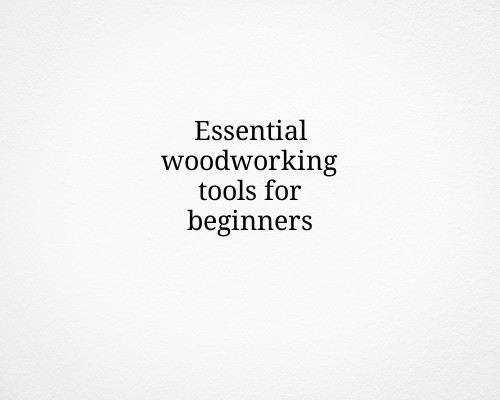Essential Woodworking Tools for Beginners
Starting woodworking can be exciting, but choosing the right tools can be overwhelming. As a beginner, you don’t need a fully equipped workshop—just a few essential tools will help you get started with most woodworking projects. Here’s a breakdown of must-have woodworking tools for beginners.
1. Measuring and Marking Tools
Accurate measurements are crucial in woodworking. Even small errors can ruin a project, so invest in quality measuring and marking tools.
- Tape Measure – A 16- to 25-foot retractable tape measure is ideal for measuring wood dimensions.
- Combination Square – Ensures 90-degree and 45-degree angles for accurate cuts.
- Speed Square – Helps mark and check right angles quickly.
- Pencil & Marking Knife – A sharp marking knife creates precise lines, while a regular carpenter’s pencil is great for general marking.
2. Cutting Tools
Woodworking involves a lot of cutting, so a few basic saws will be necessary.
- Hand Saw – A good universal handsaw can handle most cuts if you’re starting without power tools.
- Circular Saw – A versatile power saw that can make straight cuts in plywood and dimensional lumber.
- Jigsaw – Useful for cutting curves and irregular shapes.
- Coping Saw – Ideal for intricate cuts and finishing work.
3. Chisels and Planes
For fine shaping and detail work, chisels and planes are essential.
- Chisel Set – A set of sharp chisels (¼”, ½”, ¾”, and 1″) will help with carving and joinery.
- Wooden Mallet – Helps drive chisels without damaging them.
- Block Plane – Smooths rough edges and fine-tunes wood pieces.
4. Clamps and Fasteners
Woodworking requires holding pieces together securely while cutting, gluing, or assembling.
- C-Clamps & F-Clamps – Great for holding wood steady while cutting or gluing.
- Bar Clamps – Essential for glue-ups and holding large pieces together.
- Spring Clamps – Quick and easy for holding small pieces.
- Wood Screws & Nails – A variety of sizes for different projects.
5. Drilling and Fastening Tools
Drilling and driving screws are common woodworking tasks.
- Cordless Drill – A versatile tool for drilling holes and driving screws.
- Brad Nailer (Optional) – Helps with fastening trim and small wood pieces quickly.
- Countersink Bits – Allow screws to sit flush with the wood surface.
6. Sanding and Finishing Tools
To achieve smooth surfaces and a polished look, you need proper sanding tools.
- Sandpaper (80 to 220 Grit) – For hand-sanding and finishing.
- Sanding Block – Provides even pressure when sanding by hand.
- Orbital Sander – Speeds up sanding and provides a smooth finish.
- Wood Finish (Oil, Stain, or Polyurethane) – Enhances the wood’s appearance and protects it.
7. Safety Equipment
Safety is a priority when working with sharp tools and power equipment.
- Safety Glasses – Protects your eyes from wood chips and dust.
- Hearing Protection – Essential when using loud power tools like saws and drills.
- Dust Mask or Respirator – Prevents inhalation of fine sawdust.
- Work Gloves – Helps protect hands from splinters and rough materials.
8. Workbench and Storage
Having a stable surface and organized workspace improves efficiency and safety.
- Workbench – A sturdy, flat surface for cutting, assembling, and finishing projects.
- Toolbox or Pegboard – Keeps tools organized and within reach.
Final Thoughts
As a beginner, focus on mastering basic hand tools before investing in expensive power tools. Over time, you can expand your collection as your skills and projects grow. By starting with these essential woodworking tools, you’ll be well-equipped to take on various woodworking projects with confidence.
